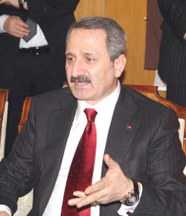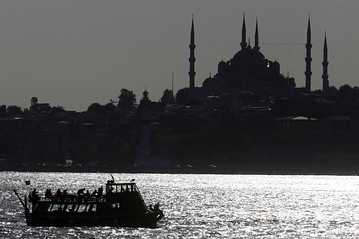By JOE PARKINSON
China may be grabbing the headlines, but one of the biggest winners of the financial crisis has been Turkey.

Traders at their computer terminals in the Istanbul Stock Exchange.
Its economy is surging—expanding 9% on the year in the 9 months to October, powered by an industrial sector firing on all cylinders. The auto industry is emerging as an alternative production hub, while free-spending consumers are sucking up easy credit from comfortably capitalized banks, helping to fire the boom.
Emboldened by stellar statistics, Ankara’s policymakers—
joined by a growing number of economists—lambast ratings agencies for refusing to bump Turkey up to investment grade.
Istanbul, the booming metropolis driving the recovery, has developed into a fashion and tourism hub and recently ranked above four Chinese cities as the world’s most dynamic metropolitan center, according to the Brooking’s Institution. Gone, it seems, are the bad old days of the 1990s when squabbling coalition governments sidestepped structural reforms and triple-digit inflation erased savings.
Turkey still has deep political divides. Almost 200 top military officers, including three retired commanders, went on trial Thursday charged with plotting against the Islamist-leaning government of Prime Minister Recep Tayyip Erdogan in a case likely to strain ties between Ankara and the secularist armed forces.
The administration has also ruffled feathers in Washington and Brussels with a more Islamic-focused policy platform. But investors have embraced the unfamiliar stability of single-party rule. And with Mr. Erdogan widely expected to secure a third term at national elections due next summer, stability—at least by recent Turkish standards—looks set to persist.
Underpinning that stability is economic potential; with a youthful population of 75 million and a relatively cheap labor force, Turkey looks a lot more like a BRIC than a bubble.
If only it were that simple.
Late Thursday the Turkish central bank cut interest rates by 50 basis points to a fresh record low of 6.5%, opting for further stimulus despite this year’s dazzling growth numbers and analysts’ warnings that the economy could overheat.
Why would policymakers in a rapidly growing economy cut rates? Because, Turkey’s success has caused a rapid inflow of hot money, or speculative investments, which magnifies the economy’s key weakness: a mushrooming current-account deficit that depends on external finance.
Policymakers in Ankara are gambling that cutting rates to dissuade speculative investors is less risky than firing a domestic consumer boom that some fear could see the economy overheat.
Turkey’s growth model is most certainly driven by consumer demand, and is heavily dependent on imports, partly because it has few energy resources and it specializes in manufacturing partly-finished goods.
Latest numbers show imports rising 35% on the year in October, while export growth slowed to 8.8%. That contributed to a current-account deficit of $36 billion in the January to October period—a huge 288% expansion on the same period a year earlier.
Partly because of that model, the quicker Turkey expands, the quicker the deficit widens, leaving the economy vulnerable to shocks if investor sentiment turns negative.
That vulnerability is magnified by the fact that a rapidly rising proportion of that deficit is financed by speculative investments, or hot money. This is the speculative demand that sweeps into rapidly growing economies as investors flee low interest rates in the U.S., the U.K. and the euro zone, to seek higher yields.
So far this year, some 70% of Turkey’s current-account deficit has been financed by speculative portfolio investments, compared to just 14% of longer-term FDI, according to the “Emerging Markets Quarterly Report” published by Barclays Capital, early December.
For some economists, the starring role that hot money plays in funding Turkey’s deficit is a red flag that could cause problems if another bout of risk aversion drives investors away from emerging markets and into gold, the dollar and other safe havens.
“The economy is exposed: sure, there’s lot of cheap money flooding in, but if sentiment was to change, we have a yawning current-account deficit funded by bad finance—and that’s making a lot of people nervous,” said Murat Ucer, an economist at Global Source Partners, an Istanbul-based consultancy.
Ratings agencies say the current account imbalance is the principle reason for keeping Turkey rating below investment grade, while government ministers here warn with increasingly regularity that hot money could undermine the economy’s gains.
But despite the imbalances and growing spectre of risk, the strength of Turkey’s rebound has shifted perceptions that the economy is a perennial underachiever. Incomes are expanding and inflation is historically low, boosting the credibility of policymakers who have overseen rapid growth and a fall in public debt.
The raw materials are in place: a strategic location between Asia and Europe, a democratic political system and age-old tradition as a trading hub make Turkey’s vast economic potential obvious.
There are possible pitfalls and Thursday’s interest rate cut is controversial. But with resurgent growth and growing credibility, policymakers can square sustainable expansion with concerns over hot money, meaning the growth story can continue.
Write to Joe Parkinson at [email protected]
via Turkey has the Potential to – WSJ.com.






